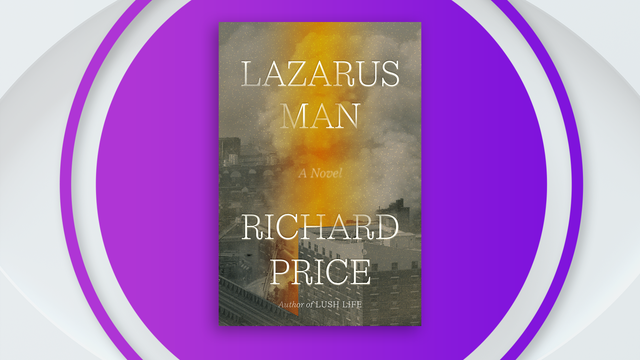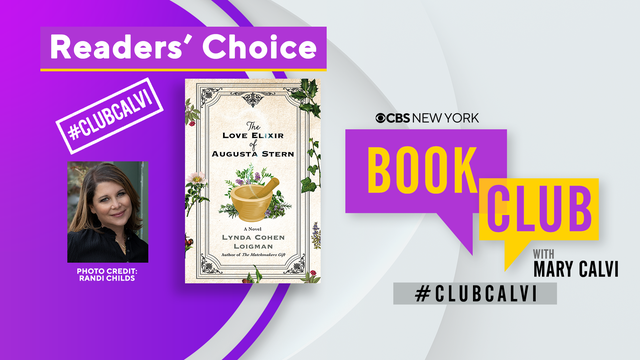Mary Calvi talks with Readers' Choice author Danielle Trussoni about new book "The Puzzle Box"
Please consider joining our Facebook group by CLICKING HERE.
Find out more about the books below.
Club Calvi spotlights new book "The Puzzle Box," sequel to the Readers' Choice book "The Puzzle Master"
In June 2023, readers voted Danielle Trussoni's "The Puzzle Master" the CBS New York Book Club's Readers' Choice. Trussoni's sequel called "The Puzzle Box" was just released and it's already a USA Today bestseller.
In Trussoni's series, Mike Brink, who suffered a traumatic brain injury that caused a rare medical condition called savant syndrome, has a photographic memory and can solve complex puzzles. In "The Puzzle Box," Brink is invited to Japan to open a puzzle box. Trussoni brought a puzzle box to show Mary.
"This is a very tame puzzle box," Trussoni said. "It opens with just 21 moves. But the one in Japan that Mike Brink has to solve is bigger, dangerous, and every person who has tried to solve it has died."
Brink opens the puzzle box and starts an adventure across Japan. Trussoni told Mary about her research for the book. Trussoni lived in Japan for two years about 20 years ago. She traveled back to Japan in 2023.
"I went to all the locations that you will find in the book: Tokyo, Kyoto, Hakone," she said.
Trussoni told Mary that she has a third "Puzzle" book planned.
"I'm just waiting to write it. People will have to read 'The Puzzle Box' and wait maybe a year or two for the next one," she said.
_____________________________________________________________________________________________________
"The Puzzle Box" by Danielle Trussoni
From the publisher: It is the Year of the Wood Dragon, and the ingenious Mike Brink has been invited to Tokyo, Japan, to open the legendary Dragon Box.
The box was constructed during one of Japan's most tumultuous periods, when the samurai class was disbanded and the shogun lost power. In this moment of crisis, Emperor Meiji locked a priceless Imperial secret in the Dragon Box. Only two people knew how to open the box-Meiji and the box's sadistic constructor-and both died without telling a soul what was inside or how to open it.
Every twelve years since then, in the Year of the Dragon, the Imperial family holds a clandestine contest to open the box. It is devilishly difficult, filled with tricks, booby traps, poisons, and mind-bending twists. Every puzzle master who has attempted to open it has died in the process.
But Brink is not just any puzzle master. He may be the only person alive who can crack it. His determination is matched only by that of two sisters, descendants of an illustrious samurai clan, who will stop at nothing to claim the treasure.
Brink's quest launches him on a breakneck adventure across Japan, from the Imperial Palace in Tokyo to the pristine forests of Hakone to an ancient cave in Kyushu. In the process, he discovers the power of Meiji's hidden treasure, and-more crucially-the true nature of his extraordinary talent.
Danielle Trussoni lives in San Miguel de AlIende, México.
"The Puzzle Box" by Danielle Trussoni (ThriftBooks) $26
Excerpt: "The Puzzle Box" by Danielle Trussoni
New York City
February 22, 2024
The Year of the Wood Dragon
Mike Brink held his dachshund, Conundrum—Connie for short—tight by the leash. It was a freezing Thursday morning in February, and yet Columbus Park was packed with dogs—Dobermans and collies, golden retrievers and labradoodles, pugs and poodles. Connie strained against her leash, desperate to join the other dogs. Brink understood her impulse to run wild, that exuberant momentum that pulled her toward the melee of dogs racing and jumping through the fresh-fallen snow. Bending to her, he unclipped the leash and she bounded away, leaping and yelping, filled with the ebullient energy of a creature on a scent.
Brink took a deep breath, exhaled, and watched the air freeze around him. It felt good to walk through the snow, a cup of hot coffee in hand, a morning paper under his arm. Good to be alive at a moment in time when, despite everything wrong with the world—and he couldn't read the news without finding a thousand things wrong—he could rely on good coffee, the daily crossword, and a park where his dog could run free.
Opening The New York Times, he riffled through the sections until he found the Games page. His puzzle was front and center, his byline in bold. His editor, Will Shortz, had asked him to make a moderately challenging number puzzle, and he'd delivered a Triangulum.
To solve it, one put a number from one to six into each circle. Identical numbers could not be put on the same gray line. He'd put a few sums in the circles, and the solutions touching each circle had to add up to that sum.
His gig as a regular contributor to the Games page was only one of Mike Brink's distinctions. He was considered by and large to be one of the most talented puzzle masters in the world. Six months before, he'd been featured on 60 Minutes. The interview dug into his past and the traumatic brain injury that had transformed him from a teenaged football star to a mathematical genius with a seemingly endless ability to solve impossible puzzles. He was described him as having "nuclear brainpower," and embarrassing memes of explosions ended up all over social media. Since then, he'd stopped giving interviews.
Brink found the attention disconcerting. He preferred the private pursuit of making puzzles to being in the public eye. And yet, after he'd solved what came to be known as "the God Puzzle"—a cipher that was the key to a murder in upstate New York—his name was everywhere. His refusal to discuss what happened—not on any of the morning shows, not even with Colbert, his favorite talk-show host—only made him more mysterious. He was called an eccentric, a reclusive genius whose gift left him too damaged to participate in the merry-go-round of consumerism known as celebrity. And, if he was honest, that assessment wasn't far from the truth.
Damaged. The word resonated with Mike Brink. He'd spent the past decades learning to live with the traumatic brain injury that left him with savant syndrome, a rare medical disorder in which the injured brain, in a frenzy of plasticity, becomes overdeveloped. For Brink, the result was an astonishing gift—he could solve the most difficult, elaborate problems with ease. He saw the world as a series of interlocking patterns. He had a photographic memory, an astonishing facility to learn and retain information, and could untangle the most impossible puzzles without trying.
His gift was a superpower, but it was also his biggest obstacle. He struggled to live a normal life and to feel good in his own skin. While there was no outward sign of damage—he was charming, athletic, and popular with his friends and colleagues—under the surface, Mike Brink was filled with anxiety. The injury had left him with a damaged nervous system, insomnia, and synesthesia, a condition in which his senses mixed, causing a distortion of colors and sounds that suffused his mental landscape. Dr. Trevers, a neuroscientist who had worked with Brink from the beginning and had even relocated his practice from the Midwest to New York City to be nearby, speculated that synesthesia was responsible for his mathematical and mnemonic gifts.
"Your brain experiences patterns the way a normal brain experiences danger," Dr. Trevers had once told him. "When you encounter a challenge, there's a release of chemicals similar to those released when one is threatened. Or when one falls in love. The result is a super-salience that feels like connection, like everything makes sense. But these chemicals wear off. Your need to engage with obstacles is a way of getting more of them. Your brain is like a thrill seeker forever raising the bar. You need more-difficult, more-dangerous challenges just to feel normal. You need to put yourself in psychic danger to feel alive."
And it was true. Brink craved strenuous acts of solving. Ten-, twelve-, fourteen-hour contests that exhausted him physically and mentally brought a day or two of peace, sometimes more. But then the cycle would begin again.
With Dr. Trevers's assistance, he'd found ways to manage his condition. Meditation, diet, and exercise all helped to a certain extent, but only momentarily. Like taking an aspirin to mask a headache, the effects wore off, often leaving Brink feeling everything he'd felt before.
Making it all even harder was the fact that his internal struggle wasn't visible to other people. He was regarded as a great success, a handsome and boyish genius, a man who had everything. And while his high profile and his unrelenting schedule of international puzzle competitions created a bubble around him, he found himself longing for the simple things of a normal existence. Friends. Family. The comfort of being just a regular guy living a regular life. This longing would have seemed absurd to the outside world. Everyone believed that success and fame made him happy. In reality, the physical and psychological effects of his injury were a slow, ever-present form of torture. Coming to terms with his gift was the hardest challenge Mike Brink would ever face.
Your brain is a labyrinth, Dr. Trevers had once said. The most challenging puzzle you will ever confront is yourself.
Brink took the final sip of his coffee and was folding the newspaper under his arm when he noticed a woman watching from the edge of the park. There were dozens of people at the dog run—it was a popular time at the park, seven-thirty on a Friday morning. But for some reason this woman stood out. When he met her eye, she didn't blink but watched him, her gaze tracking him. Something about the equanimity of her expression, the way she seemed to recognize him but made no sign of approach, made him feel uncomfortable.
As did her attire. It was frigid, the wind sharpened to a point, and yet she wore nothing more than a black blazer over a hot-pink T-shirt. Her hair was windswept, with a thick strand dyed bright blue. She was Asian, young, and wore no hat, no gloves, not even a scarf. It was as though she didn't feel the subzero wind at all.
Brink pulled a rubber ball from his jacket pocket and threw it to Connie. His fingers stung with cold. He rubbed them together and glanced back at the woman. The wind didn't even faze her. What did she want? Why was she looking at him like that?
It was possible that she'd recognized him. It didn't happen often—people knew Mike Brink's puzzles, not his face. Still, occasionally someone would approach him, one of his puzzles in hand, and ask for an autograph or a selfie. But this woman wasn't holding one of his puzzle books, and she didn't seem like the type of person to pose for pictures. Deciding to ignore her, he threw the ball to Connie a few more times, then clipped the leash onto her collar and headed home.
He'd completely forgotten about the woman from the park until he walked up the five flights of stairs to his loft and found her waiting at his front door. Her skin was raw from the cold, her cheeks bright pink, her black leather Doc Martens covered in salt and snow from the sidewalks. Clearly, she'd run from the park. That explained how she beat him to his apartment. It didn't explain how she knew where he lived.
"Hey there," she said, looking him over. "Didn't mean to startle you." She offered her hand. "I'm Sakura. Sakura Nakamoto. Can you talk a minute?"
Her name was Japanese, but she spoke to him in colloquial, unaccented English. He shook her hand. "Mike Brink."
"I know who you are."
Before he could respond, she reached into the pocket of her blazer and, like a magician conjuring a dove from a hat, removed a small wooden box and placed it in the palm of his hand. She stepped away carefully, as if the box were dangerous, a delicate thing wired with explosives. Brink stared at it, amazed. There, light as a pack of cards in his palm, was a Japanese puzzle box.
Turning the box over, he examined it from all sides. It was simple, elegant, the wood surface glossy and smooth. He glanced back at Sakura. Why in the world had she followed him from the park to give him a puzzle box?
She bowed, a formal gesture that seemed out of place in the dingy vestibule outside his loft. "In the name of the emperor of Japan, please accept this challenge."
Brink caught his breath as her meaning became clear. The woman was not an intrepid fan. She hadn't followed him home looking for an autograph. She'd brought an invitation to solve the most challenging and mysterious puzzle in the world: the Dragon Puzzle Box.
Excerpted from The Puzzle Box by Danielle Trussoni. Copyright © 2024 by Danielle Trussoni. All rights reserved. No part of this excerpt may be reproduced or reprinted without permission in writing from the publisher.









